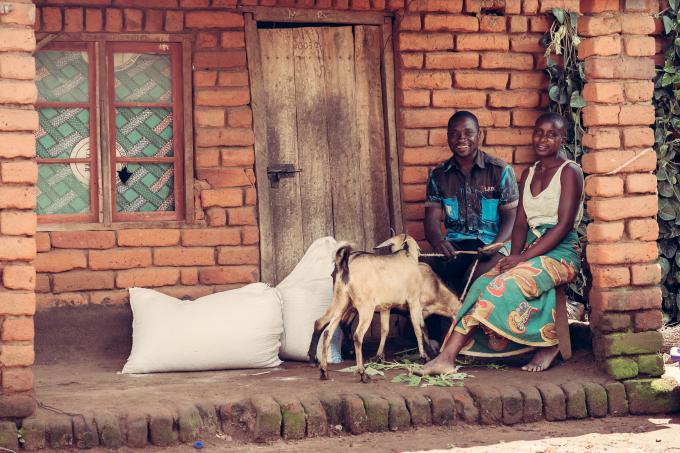Anticipatory Action Uplifts Lives in Zomba District

For many years on end, 40-year-old Estere Hayera always had no food to keep her through the lean period, which runs from November to March.
Hunger was recurrent in the household since, at the time she was supposed to be cultivating her garden, she was out doing piecework in other people's fields in Naphama Village, Traditional Authority (T/A) Mbiza's area in Zomba district.
At the end of the day, she could find some money to buy maize, which is expensive during the lean period. In some instances, she was paid some kilogrammes of the staple to feed her four children, which include four-month-old twins and two orphans.
“It was a vicious cycle of poverty. This is the time I was supposed to be tending my own garden but I was busy in other people's fields. Hunger was always knocking on our door and the only way out was to do piecework to cushion the hunger,” she recalled.
A few minutes from her home, in Thom Village, Mickson Chiwaya, 43, shares her story of hunger, poverty and despair.
“It was hopeless for me to raise my five children because of hunger and poverty. When others were in their fields, I would cross the lake into Mozambique to find work where I would be paid in cash or maize,” he said.
According to Jailos Ndalama, the area’s civil protection committee secretary, 3,257 households like Hayera and Chiwaya face hunger every year, especially in the lean period. These, he added, have benefitted from the Anticipatory Action (AA) project run by Save the Children in the district, which has 40,000 households.
Under the project, beneficiaries got a total of K125,000 in five months to stockpile maize, buy livestock and join village savings and loans (VSL) groups to end hunger and poverty.
“Beneficiaries were selected from the most vulnerable. These are the elderly, the disabled, pregnant women, child or female-headed households as well as that harvested little or absolutely nothing the previous season.
“Apart from getting the cash, which was split in instalments of K75,000 and K50,000, we trained them on proper financial management,” he said.
Today, Hayera and Chiwaya are happy that they no longer sleep on empty stomachs since they started benefitting from the programme in October 2022.
Having bought two 50-kilogramme bags of maize and two ducks, Hayera joined a VSL in the area where she invested K10,000 and, with interest, her shares have doubled.
“Hunger is no longer my problem. During this period, I was cultivating in other people's garden. But now, I concentrate on my gardens where I am growing soya beans, groundnuts and maize. I also grow tobacco under a farmers’ club,” she said.
Haila said she now sends her eldest daughter to a secondary school, a thing she and her husband could not previously afford.
In January, she had one bag left in her stock and if that would not be enough until the next harvest, she will sell her livestock.
In Chiwaya's homestead, the story is more or less the same. With his wife Esther, their home is happier since they bought two bags of maize and two goats. His savings at the VSL have quadrupled from the initial K7,000 in October to K28,000 in January.
“My life has completely changed. I never dreamed of owning livestock, not even a chicken. But look at me now, my life is totally different,” he said.
According to him, he still has a one-and-a-half bag of maize that will see him through to the next harvest.
A promoter in the area, Zione Yuba said, apart from the lessons in financial management, beneficiaries are also trained in nutrition and lessons from breastfeeding women like Haila.
Ndalama observed that before dispensing money to the beneficiaries, they are trained in financial management and the importance of joining VSLs.
He indicated that the approach of providing support before disaster strikes works well because beneficiaries are prepared.
“The livestock enables them to sell and buy food in time of need. Others can raise the farm animals and sell much later. While being in a VSL is a sure way into financial independence,” said Chiwaya.
 Malawi
Malawi